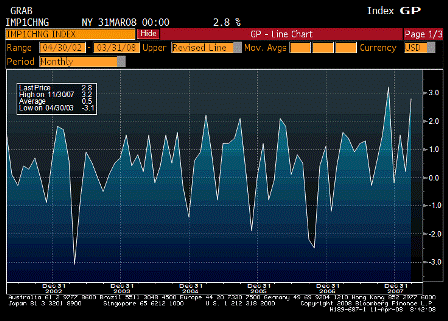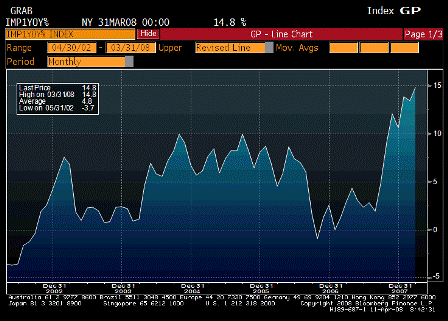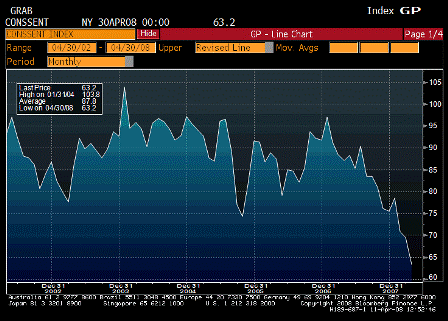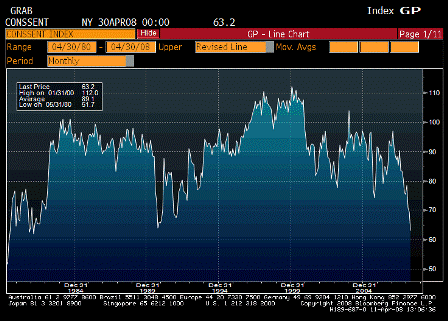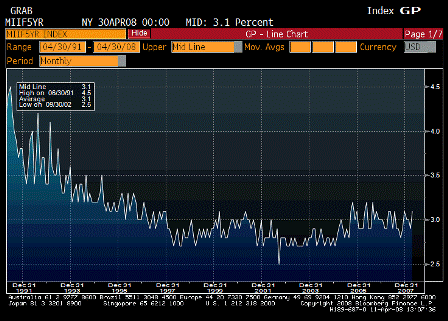Import Price Index MoM (Mar)
| Survey | 2.0% |
| Actual | 2.8% |
| Prior | 0.2% |
| Revised | n/a |
Import Price Index YoY (Mar)
| Survey | 13.7% |
| Actual | 14.8% |
| Prior | 13.6% |
| Revised | 13.4% |
This is a very strong inflation channel.
U. of Michigan Confidence (Apr P)
| Survey | 69.0 |
| Actual | 63.2 |
| Prior | 69.5 |
| Revised | n/a |
From Karim
- Michigan survey takes out low from 1990-91 recession; prior lowest point was March 1982. Decline was from 69.5 to 63.2
U. of Michigan Survey since 1980
Interesting how low ‘confidence’ is in light of how much better GDP and employment is doing now vs then.
Part of it is the rising influence of the media, and part are the factors behind the export boom that are causing us to consume less and instead export more of our own output.
The channel this time around is rising costs for food and energy take away the purchasing power power needed to buy the rest of our output, and foreigners get to consume it instead via US exports.
- 5-10yr inflation expectations move to higher end of recent range
5yr Ahead Inflation Expectations
Yes, it’s part of the equation, as above, and the FOMC ‘knows’ it can’t allow inflation expectations to elevate.
While the Fed gives the 5 year more weight, it also watches the one year, particularly when it spikes.
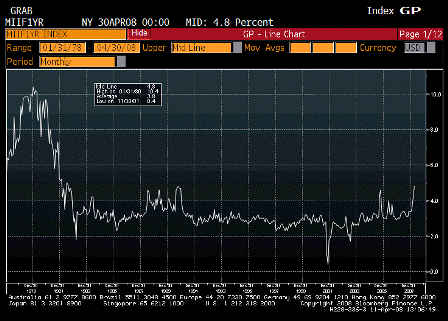
1 yr Inflation Expectations
In today’s report the one year survey hit 4.8%, they highest since one 4.8% reading in 1990. The only time it’s been higher was during the ‘great inflation’ of the 70’s- early 80’s.
- Worsening confidence also visible in job leavers component of employment report-% of workers who voluntarily leave their jobs (chart 3). Tends to rise when times are good and vice-versa. When declining, tends to be associated with lower wage growth and core CPI (an important piece of the output gap argument).
Other comments from Michigan survey make from grim reading:
- There have only been a dozen other surveys that have recorded a lower level of consumer sentiment in the more than fifty-year history of the survey.
- Consumers expected gains in their nominal incomes of just 1.0% in April, the smallest gain expected in three decades.
- Three-in-four consumers expected bad times financially in the overall economy during the year ahead, the largest proportion recorded since 1980, and the fourth highest proportion in more than fifty years.
- A record 41% of all home owners reported that their home had lost value during the past year
- Just 5% of all consumers expected the unemployment rate to decrease in the year ahead, the smallest proportion ever recorded.
- Uncertainty about future income and job prospects has had a devastating impact on buying plans, with consumers citing these uncertainties three times as frequently as they did a year ago. Purchase plans for furniture, appliances, home electronics, and similar goods fell to their lowest level since the 1990 recession, with one-third of all consumers specifically mentioning their uncertainty about jobs and incomes as their primary reason. Vehicle buying plans also fell to their lowest level since the 1990 recession, with one-third of all consumers citing uncertainty about jobs and incomes as well as the future price of gasoline.
That’s the Bernanke vision as per his latest congressional testimony- less consumption and more exports and investment. Looks good, feels bad.

